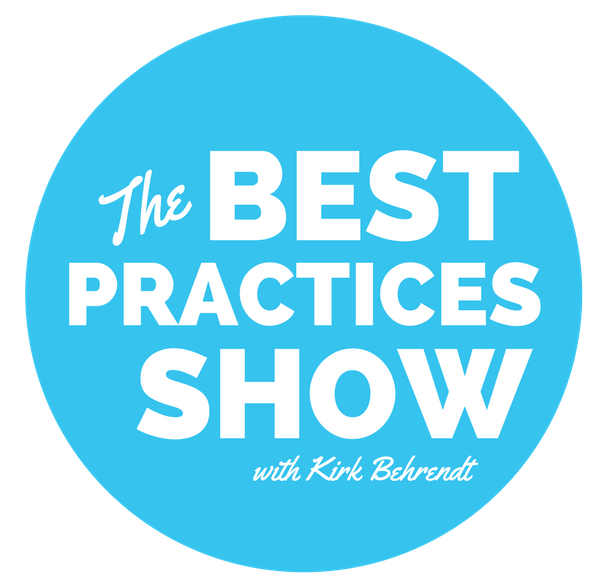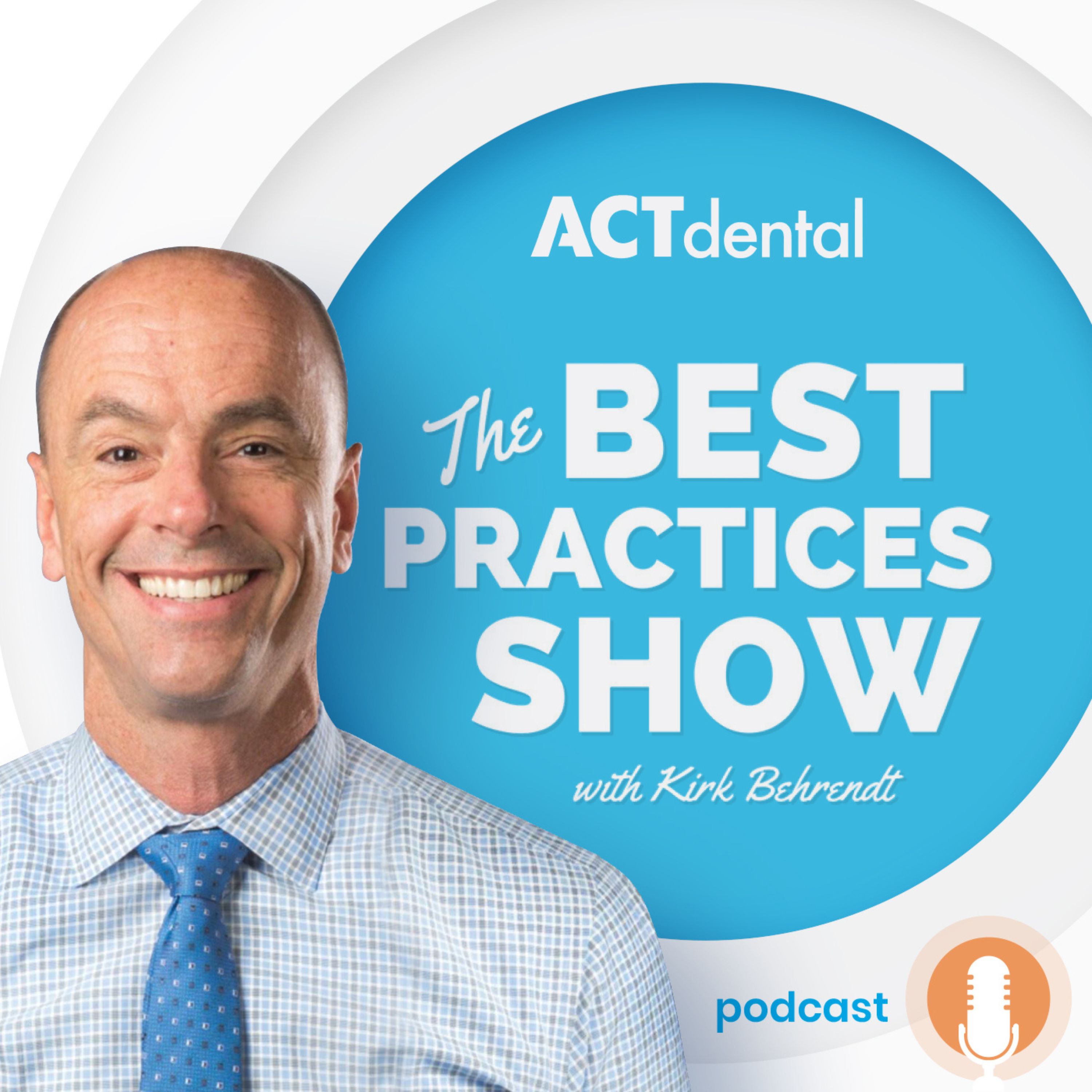Episode 472
472: The Truth About Transition from Analog to Digital - Dr. Brandon James
472: The Truth About Transition from Analog to Digital - Dr. Brandon James
Digital is the future. If you embrace the change now, your dentistry will be more accurate, more efficient, and have more predictable results. And to help you transition from analog to digital, Kirk Behrendt brings in Dr. Brandon James to share his transition journey, advice for handling technology phobia, and ways to adjust to the learning curve. Digital dentistry is advancing — don't be left behind! To learn how going digital will benefit your patients and your practice, listen to Episode 472 of The Best Practices Show!
Main Takeaways:
Without the right people to use it, expensive equipment is just décor.
Transitioning to digital will help you empower your team.
It will help you be better, faster, and more efficient.
Digital can empower patients’ decision-making.
Don't be last to go digital — it’s the future.
Quotes:
“If you're purchasing all this equipment and your “why” is so that you can have a better picture for your Instagram post or your Facebook post, that's the wrong why.” (4:04—4:11)
“In the world of digital dentistry in full arch, it’s not necessarily that what you're doing in the analog world is not working — it is working. But the digital world allows you some more efficiencies and some more ease in what we’re doing.” (8:15—8:32)
“You've got to have the right people in place to institute this. Because you can buy $150,000 of equipment, and then it just comes and sits on a shelf. And we’ve all done that, in some regard. But when the stakes are that high, when the dollar figures are that high, you really need to have people in place to implement it.” (10:25—10:46)
“I love dentistry. I truly do. But I don't want to be doing clinical dentistry till 3:00 or 4:00 in the afternoon, and then turn on my digital designer hat and sit there and design cases for three, four, five hours into the night, and then see my family and kids at 9:00 at night. That's not what I signed up for.” (11:44—12:02)
“I absolutely believe that all of those rules and regulations that we all abide by of prosthodontics in the analog world, those still apply. Just because you buy a piece of machinery doesn't take out the rules of the game. It’s intended to enable you to do it a little bit better, maybe do it a little bit faster, do it a little bit more efficiently so that it then becomes a little bit more affordable for the patients, and you can control that cost. Because treating these patients is hard work.” (12:36—13:03)
“For us, it wasn't that anything was not working in the analog world. It was just that we started seeing that maybe we can do things a little bit quicker, a little bit faster, a little bit more efficient, have a little bit more predictability in the process. And that's where we’re going with things.” (13:13—13:31)
“My favorite part [of the transition process], at this stage of the game that we’re in, is seeing [the team] take ownership of the process itself and empowering them to feel like they have a real say in the process.” (14:30—14:48)
“[Digital] also, I think, really empowers the patients’ decision-making from a standpoint of, they can see. A lot of things that we talk about and makes sense to us, it doesn't make a hill of beans to the patient. We might as well be talking Greek to them. But when they can tangibly see something on the screen instead of having all that goopy impression in their mouth, or we can do a facial scan and all of a sudden it pops up on the screen and, ‘Oh my gosh, that looks a lot like me,’ it’s not just this pixelated avatar-looking thing, it’s a powerful motivational — I mean, we never like to say it, and it causes my toes to curl a little bit, but it is a good sales thing for people to see that, and it’s an empowering thing for that process.” (16:04—16:55)
“The more information that we can put in front of [patients], I really feel that it empowers them to make a confident decision for themselves.” (17:16—17:24)
“We started slowly phasing [digital] in. And in the busyness of the day when it gets going, you always will fall back onto what you tried-and-true and know best. And we fought that process for a while. And it really boils down to leadership 101 and me taking the role of saying, ‘Listen. We’re going to take a step back and recommit ourselves to doing this.’ And once we did that, it’s become second nature.” (18:28—19:05)
“I didn't want to be the last to do [digital]. And I think there are no ifs, ands, buts, or doubts in my mind that it is the future.” (23:34—23:42)
“Successful people do consistently what others do occasionally.” (26:48—26:50)
“People will work for a “what”, but they will give their lives for a “why”. And that's not necessarily laying down your life, but they will pour out their souls for meeting the why of why we’re doing things, as long as they understand it, as long as it’s said, as long as it’s written down, as long as it’s lived by in the office.” (27:17—27:38)
“Do I feel like it’s as comfortable as what the analog world was to me for the last 15 years? No. Not there yet. But we’re going to get there. That's just part of it. To quote the good Dr. Sisler from his podcast, there's not a plan B. We’re not going back. So, this is plan A, and we’re sticking to it, and we’re going to be passionate about it.” (27:44—28:12)
“There is no arguing on the accuracy of digital platforms and digital workflows as opposed to human beings doing it. I mean, it’s only nature. We’re imperfect human beings. And so, the accuracy of it and the lack of, when all goes well and you deliver a full arch 30, 45, 50 minutes after they’ve just had surgery and you don't pick up a handpiece and don't touch the occlusion, it’s like, ‘Wow, that's pretty cool. I didn't know that existed.’ And so, that is probably an aha moment — but knowing that you don't just plug in your machine, and that happens. There's a process of learning and a process of becoming an expert at it that we’re all still doing.” (29:33—30:29)
“There are very capable restorative dentists out there all across this platform that absolutely can treat these cases. But they didn't just all of a sudden, ‘Oh, let's do it.’ You need to get educated. But for me, even more importantly, beyond the education . . . is mentorship.” (32:41—33:06)
“There's nothing about the machinery that is going to make you capable of doing the product. You've still got to put in the effort. You've got to have the knowledge base of what you're doing to stay safe, to stay out of harm’s way, and to instill predictability.” (33:42—33:56)
“Embrace the new decision. Think hard on it. Be committed to it. And once you do, then dive in.” (37:47—37:58)
“Don't be scared of not being perfect, or don't be scared that, ‘Oh my gosh, the patient’s going to think I don't know what I'm doing if I'm learning.’ Just take action, because that’s what I had to tell myself. And it will all work out.” (38:18—38:35)
Snippets:
0:00 Introduction.
1:49 Dr. James’s background.
3:09 His journey in the transition process.
8:57 Get the right group in play.
14:01 Favorite parts about the transition process.
17:34 The learning curve to adapt to new technology.
20:50 Find out who you are as fast as possible.
22:05 Digital is the future.
25:33 Where Dr. James is on the transition journey.
28:51 Aha moments at the Full Arch Masters course.
30:53 Where to start on a limited budget.
37:30 Last thoughts on the transition to digital.
41:41 About Dr. James and Dr. Pat Lillis’s ITA (Implant Training Academy) course.
Reach Out to Dr. James and Dr. Pat Lillis:
Dr. James’s Facebook: https://www.facebook.com/DrBrandonJames.FindaTopDoc/
Dr. James’s social media: @brandonjamesdds
Dr. Lillis’s email: drlillis@mac.com
Dr. Lillis’s social media: @drlillis
Resources:
Full Arch Masters Course: https://fullarchmasters.com/
Kolbe assessment: https://www.kolbe.com/
StrengthsFinder: https://www.gallup.com/cliftonstrengths/en/252137/home.aspx
DiSC assessment: https://www.thediscpersonalitytest.com/
Kois Center: https://www.koiscenter.com/
Spear Education: https://www.speareducation.com/
The Dawson Academy: https://thedawsonacademy.com/
Seattle Study Club: https://seattlestudyclub.com/
Your Time in Jelly Beans by zefrank1: https://www.youtube.com/watch?v=BOksW_NabEk
Roy Spence, The Purpose Institute: https://thepurposeinstitute.com/
Register and watch Dr. Lillis’s recorded ITA session: https://web.cvent.com/event/cc0dcfa8-f232-4b7c-b2d4-5e86905fed0e/summary
Dr. Brandon James Bio:
Dr. Brandon James received his Doctor of Dental Surgery (D.D.S) degree in 2005, graduating with honors from the University of Oklahoma College of Dentistry. He completed an advanced postgraduate program and obtained his certificate in Graduate Prosthodontics from the University of Texas Health Science Center in San Antonio in 2008. Following completion of his training, Dr. James moved to the greater Kansas City area and began his private practice.
Dr. James is an active member of multiple professional organizations and is an up-and-coming well-known lecturer to dentists across the country in the field of Prosthodontics and Restorative Dentistry. Dr. James brings with him a level of knowledge and understanding that is second to none when it comes to diagnosing, treating, and managing even the most difficult of your dental problems. Dr. James is proficient in all aspects of implant, esthetic, and prosthetic dentistry.


